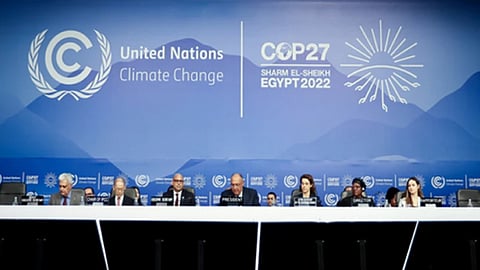

COP27 host Egypt has secured nearly $10 billion in funding in ways it hopes can provide a template for other developing nations to obtain climate-related finance, its international cooperation minister said. Finance is one of the most contentious issues at climate negotiations as poorer countries demand rich nations pay a larger share of the cost of dealing with a warmer planet.
Over the next year, when Egypt will retain the presidency of the United Nations climate talks until COP28 in the United Arab Emirates, International Cooperation Minister Rania al-Mashat said Egypt was keen to share what it has learnt. "We will be ready to exchange experience and discuss with them what is it that we can do to replicate this in other countries," she said, referring to climate funding.
The funding includes grants, concessional finance and a 100 million euro ($103.82 million) debt swap from Germany and covers development projects ranging across energy, food security, water, transport and the environment. It is designed to build on Just Energy Transition Partnership (JETP) deals that have mobilised public and private money to mitigate greenhouse gas emissions by winding down coal-generated power in South Africa and Indonesia.
For countries that are not major coal producers, it provides a way to access larger-scale financing, Mashat said. "In the case of Egypt and other African countries, we want to show the link between mitigation and adaptation," she said in an interview on the sidelines of the COP27 climate summit in Sharm el-Sheikh. "We want to show how a country can move and utilise the pledges into implementable projects."
Egypt has nine projects under its NWFE platform, which covers energy, water and food security, and has a second E-PACT platform covering transport and the environment. Many countries have been talking to multilateral development banks about actions similar to NWFE, Mashat said. NWFE includes projects to improve irrigation and crop yields for farmers, and to develop desalination to supplement scarce water resources.
Most of the funding is to be directed towards renewable energy, with a project to phase out 5 Gigawatts (GW) of ageing gas-fired power stations from next year and develop 10GW of renewable energy, mainly from wind. Western states and the European Bank for Reconstruction and Development (EBRD) this week pledged more than $500 million in public financing for the energy project, including the debt swap with Germany.
That money will go towards investments in the transmission network and helping workers affected by the decommissioning of power stations, laying the ground for private investments in renewables, said Harry Boyd Carpenter, EBRD managing director for climate strategy and delivery. "The logic of the programme is that renewables are so cheap you don't need grant support for them. What you really need is grant support for the public investments that enable the renewables," he said.
Visit news.dtnext.in to explore our interactive epaper!
Download the DT Next app for more exciting features!
Click here for iOS
Click here for Android